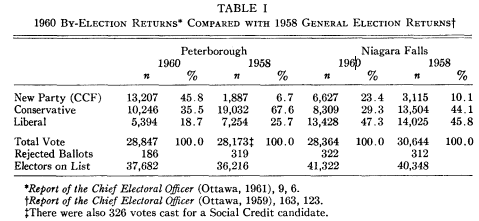The most interesting fact about the by-elections held in Peterborough and Niagara Falls on October 31, 1960, was not so much that the Conservatives (in power in Ottawa) lost them—or, rather, lost the one and failed to gain the other—as that the New Party won the Peterborough seat, with 46 per cent of the vote, and got 23 per cent of the vote in Niagara Falls. Taking the two constituencies together the New Party polled a larger popular vote than did either the Liberals or Conservatives: no minor achievement for a party that was making its first two appearances on the federal electoral scene, a party that at the time had neither a name nor a national leader and whose platform was still in the process of being formulated.

Who voted New Party and why? These were the first questions that seemed to need answering. Obviously, old-line socialists could not account for a very large part of the Peterborough poll since the best the CCF had ever done in Peterborough, in federal elections, was to get 12 per cent of the vote in 1945. In Niagara Falls, it is true, the CCF had reached the 23 per cent mark in 1949 but in subsequent federal elections its support had steadily fallen off—to 15 per cent in the 1950 by-election, 12 per cent in 1953 and 10 per cent in 1958. Was it, then, the alliance of the CCF with organized labour, under the New Party banner, that had done the trick? Had organized labour so rallied its supporters behind the New Party candidate, particularly in Peterborough, as to make the vote practically a labour affair? Or was the New Party vote more evenly distributed across the two constituencies, with all classes participating more or less equally in it? What about the different age groups and sexes? Whatever the distribution, was the vote simply a protest against the governing party in Ottawa as seems so frequently to be the case in by-election returns? If simply a protest why had it gone New Party rather than Liberal or, in the case of Niagara Falls, why had it not gone even more Liberal? Did the personalities of the candidates make very much difference? Or were election issues and party policies more important than personalities? Finally, to what extent, if any, did the New Party vote reflect or presage a fundamental realignment of political forces?